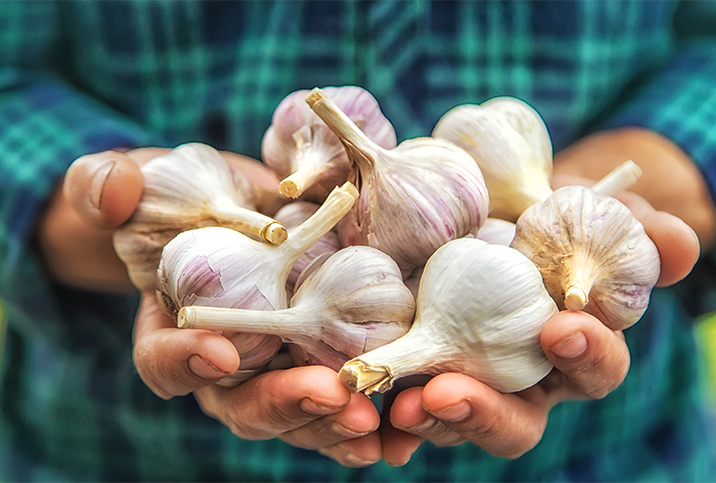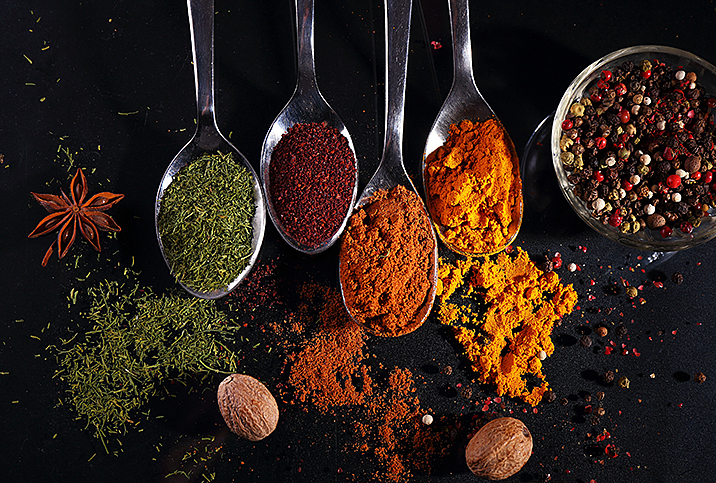Increase Your Blood Flow With 5 Common Kitchen Herbs

Herbs and herbal remedies are the basis of traditional medicine, and many come with the added benefit of making your dinner taste better. They are ubiquitous enough that the National Institutes of Health (NIH) has a branch—the National Center for Complementary and Integrative Health (NCCIH)—devoted to compiling academic research on alternative medicines and publishing a compendium of herbs called "Herbs at a Glance."
Some are exotic, but you'll likely recognize many items on this list: garlic, aloe vera, tea tree oil and ginger. In fact, to improve blood flow, you need look no further than your kitchen cabinets.
While herbal supplements aren't subject to the same testing as pharmacological drugs, because the Food and Drug Administration considers them foods, humans have known certain herbs and herbal remedies possess medicinal qualities for quite literally thousands of years.
One of the more documented benefits of some herbal supplements is how to improve a body's blood flow. Men experiencing erectile issues may benefit from adding a few flow-boosting herbs to their diet.
After all, erectile complications are multifaceted, and different medications and health conditions can lead to issues without a person realizing it.
Certain pharmaceutical medications, such as vasoconstrictors, anticancer agents, monoclonal antibodies and birth control, can harm blood vessels significantly, according to Emily Bintrim, Pharm.D., a pharmacist in the Pittsburgh area, as well as pharmacy student Abigail Holowka.
Damaged blood vessels can create blood clots, or increase or decrease circulation in certain regions of the body, they explained. Other drugs directly impact blood flow, most obviously, erectile dysfunction (ED) drugs such as sildenafil [brand name: Viagra] and tadalafil [brand name: Cialis].
Importance of good blood flow
But why is good blood flow important? Well, other than the obvious—supplying blood to the organs that require it—proper blood flow can also decrease your risk of disease or other heart conditions.
"When blood is not moving, there is an increased risk of getting a blood clot," Bintrim said. "You can get plaque buildup from high cholesterol. You could have heart failure resulting in blood not being pumped well enough throughout the body."
Natural ways to help heart health and promote good blood flow are numerous.
"Common household herbs are seen as a second-degree medicine, so their medicinal effects fall between the potency of regular food [first-degree medicine] and herbal supplementation such as tinctures and capsules [third-degree medicine]," said Cait DiCicco, a certified health educator and yoga teacher studying to become a naturopathic doctor at the Naturopathic Institute of Therapies and Education in Mount Pleasant, Michigan.
She added that any herbs and spices with a warming effect are good for blood circulation, and a number of these spices are commonly found in the kitchen.
1. Turmeric
Heavily promoted as a supplement to help with a variety of conditions, turmeric is mainly used as an anti-inflammatory. Turmeric's yellow color comes from the compound curcumin, to which many of its numerous benefits are attributed. In fact, studies have examined the effects of curcuminoids on blood flow, determining they can boost vascular health in older individuals by increasing nitric oxide bioavailability and reducing oxidative stress.
2. Ginger
A common ingredient in Asian dishes and Eastern medicine, ginger is used less in Western-style cooking. However, ginger tea is available in the United States and has been linked to helping with nausea and vomiting, especially in patients undergoing chemotherapy. One study indicated ginger offers several health benefits and cardioprotective properties, namely cardiotonic, antihypertensive, antihyperlipidemic and antiplatelet effects.
3. Garlic
Garlic is most commonly used, medicinally, to help with conditions related to the heart and blood vessels, including high cholesterol and high blood pressure (in addition to making meals delicious). Significant research has been done on the effects of garlic on the cardiovascular system, showing a positive overall effect and a reduced risk of cardiovascular disease in both human and animal studies.
Historically, garlic has also been used to keep vampires at bay. So there's an added benefit.
4. Cayenne
A spicy pepper, cayenne is bright red in color and anywhere from four to 20 times hotter than a jalapeño. It's also incredibly beneficial for your heart health and blood flow, for several reasons.
First, cayenne is loaded with antioxidants and anti-inflammatory properties, both of which benefit overall health because inflammation plays a role in many diseases, including heart disease. Researchers found individuals who eat chili peppers enjoy increased longevity compared to those who don't; as an added benefit, pepper-eaters tend to add less salt to their food. Too much salt, of course, isn't so great for your heart health.
5. Cinnamon
Cinnamon has long been used in traditional medicine and even today is recommended as a supplement to treat conditions such as irritable bowel syndrome (IBS) and diabetes. Like other herbs on this list, cinnamon has anti-inflammatory properties but can also reduce blood sugar levels and help lower cholesterol. One study, published in 2003 in the journal Diabetes Care, reported that individuals taking insulin and cinnamon supplements saw major decreases in their blood sugar levels over the course of 40 days. Even better, the effects remained after they had stopped taking the cinnamon.
Which herbs do I take for good blood flow?
"Honestly, it totally depends on the individual," DiCicco said. "Every body and person is completely unique, and every herb is, as well. There are obviously herbs, vitamins, minerals and supplements in general that are helpful for circulatory system issues, but that doesn't mean they're right for everyone."
Herbs aren't that different from pharmaceuticals. As DiCicco explained, pharmaceuticals are fourth-degree medicines—the highest degree there is—that were derived from herbs. In a sense, pharmaceuticals can be viewed as amplified versions of certain herbal medications.
The other benefit of herbs, as you probably know, is they can enhance the flavor of food. Even the ones listed above could be sprinkled into your next pot of chili, adding flavor and providing some of those blood-flow-boosting benefits.
"Herbal medicine takes longer to heal, and our society often calls for instant gratification," DiCicco said. "However, if someone is willing to put in a little extra time, they can find true health without the risk of causing new problems."
Editor's note: These statements have not been evaluated by the Food and Drug Administration. Our medical experts advise that you consult with your primary healthcare provider before you begin using a supplement. This information is not intended to diagnose, treat, cure or prevent disease.


















